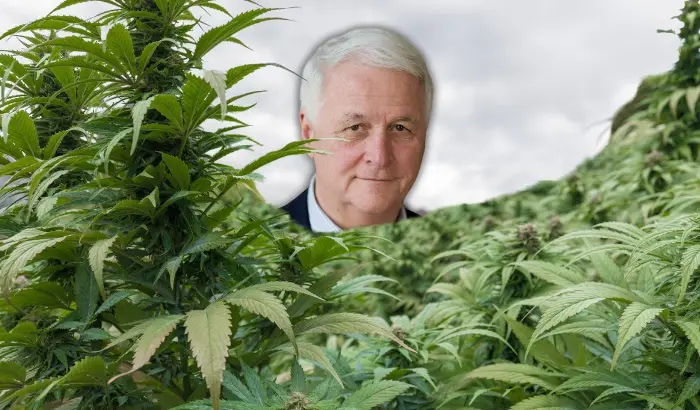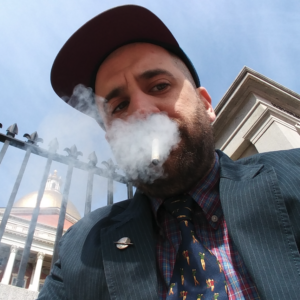
For the Massachusetts cannabis community, Bill Delahunt will always be the prosecutor-politician who attempted to make a killing in the weed biz and got called out for it
If you’re looking to spend a whole afternoon cruising for cannabis at several pot shops south of Boston, the Bill Delahunt Parkway will come in handy.
On the east end of the road, in Abington up near the Weymouth border, you will find Bud’s Goods & Provisions, Natural Agricultural Products, and pretty soon an Elevated Roots.
And on the end of the thoroughfare named for the former Norfolk County district attorney and US House member, those passing through Rockland can choose between Green Rock Cannabis, Health Circle, and Cannavana.
That’s about the extent of Delahunt’s cannabis legacy. But history nearly unfolded in a different direction, in which the former congressman would have basically become the Bay State’s first cannabis oligarch.
Massachusetts voters passed a ballot measure to legalize medical marijuana in 2012. After more than a year of bureaucratic foot-dragging, in January 2014 the Department of Public Health—which was tasked with running the state’s nascent program at the time—awarded the first 20 licenses to operators, which had to be set up as nonprofits. To the surprise and horror of many, three of those approvals were for dispensaries proposed by Medical Marijuana of Massachusetts—in Plymouth, Mashpee, and Taunton—where Delahunt was president.
As Luke O’Neil wrote for Boston Magazine at the time, “You don’t need to look that deep into the licensing process to come away with a bad taste in your mouth. Let’s begin with the very idea that Delahunt, the District Attorney for Norfolk County from 1976 to 1996—a man whose job it was, for decades, to arrest and prosecute citizens for the possession and sale of marijuana—now has three state-issued licenses to deal weed. On its face, this is a perversion so absurd it’s practically comical. It’s so unprecedentedly offensive, it’s hard to find a comparison.”
Delahunt defended his weed windfall, telling WBUR, “I don’t even know the individual who actually made the final decision. But this was a very rigorous process. It clearly was done in a way that eliminated any political influence whatsoever. Clearly, when we went before those communities, many of us were well-known, and I think there’s a comfort level being with people—whether they be in medicine or government or involved in civic organizations—that creates a particular rapport with a community.”
The buzz didn’t last very long. Some companies that lost out sued the state, cannabis advocates lost their collective mind, and the hits just kept on coming, with the Boston Globe exposing “possible conflicts of interest between the agency and some of the winning applicants,” like that “Public Health Commissioner Cheryl Bartlett held fund-raisers for Delahunt in the mid-2000s when he was still in Congress, though she said she was not involved in the final selection of winning companies.”
In June 2014, the DPH revoked the licenses for Medical Marijuana of Massachusetts. In response, the former elected official sued regulators, claiming: “The Delahunt company argues that the Department of Public Health’s reversal in June was arbitrary and capricious because it was based on publicity considerations rather than the merits of the company’s applications. It also said the health department’s about-face was without regulatory or statutory authority and without any form of due process.”
By the fall, Delahunt had resigned from the company, and reporters were happy to start helping him restore his reputation. As the Patriot Ledger reported in September 2014:
Delahunt said the primary reason he is leaving the non-profit is to spend more time helping another company – the name of which he didn’t disclose – that aims to establish more addiction-treatment services in the Northeast.
However, he also insinuated that his ongoing affiliation with Medical Marijuana of Massachusetts – and the media attention that came along with it – may be a detriment to the company, and it could have prompted the state to take away its three licenses.
“Maybe they lost the three (licenses) because of me, but they didn’t get the three because of me,” Delahunt said of his non-profit. “If they do receive a license at some point, they will be the gold standard because these are people who are known in the community, who are admired and who are respected.”
In 2015, Delahunt went on a redemption tour, telling journalists about his “fight” to open medical dispensaries. Beyond the media, he was also somewhat vindicated by a Suffolk Superior Court judge, who that year ordered regulators to allow his former company to move forward in Mashpee and Plymouth, “ruling it was improperly denied licenses last year.”
For a lifelong cannabis crusader like Bill Delahunt, the whole experience was just one more hurdle in a never ending struggle.
























